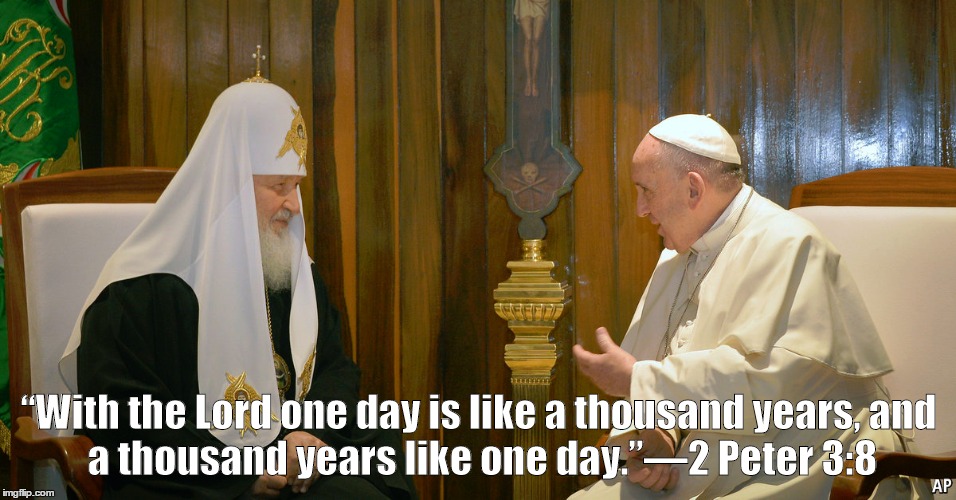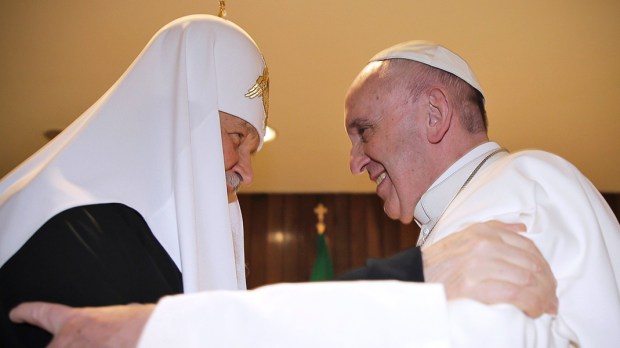
When I see this picture, I am reminded of something Pope St. John Paul II said: “The Church must breathe with her two lungs!”
In another apostolic letter, Orientale Lumen (The Light of the East), Pope St. John Paul II said, “In contemplating [the Eastern Church], before my eyes appear elements of great significance for fuller and more thorough understanding of the Christian experience … the Christian East has a unique and privileged role as the original setting where the Church was born. … Tradition is the heritage of Christ’s Church.”
In St. Paul’s second letter to the Thessalonians (2 Thess. 2:15), we are admonished to cling to our traditions that we were taught either by letter or by word of mouth. Many misunderstand apostolic tradition as some sort of manmade stratagem to control a medieval and ignorant populace. This of course could not be further from the truth. One need only look at the Church throughout any age to see she has always had very little control over her wayward children. Nevertheless, Holy Scripture tells us that it is indeed the Church who is “the pillar and bulwark of truth” (1 Tim. 3:15).
The universal church, in its many liturgical forms, has handed down these traditions as they were taught by the apostles who received their instruction from Christ himself. But sometimes the machinations of men cleave at the mystical bride of Christ, his church. To understand the ancient Liturgical Church is to understand not only first century pre-Talmudic Judaism, but also the earliest seeds of a very large family. To understand the universal church, one ought not see her through the prism of American rugged individualism or post-Enlightenment liberalism. The universal church is neither a Democratic-run social justice program nor a Republican tax exempted corporation. She is love in action, best symbolized as a family and by the family, a family that gathers around to hear the stories of old, to learn the lessons of the past and to share a meal.
This family is “love in action,” and it can not be separated by death, cultures, customs or the prevailing ism of the age. This family is united across oceans, epochs, languages, philosophies, dynasties and empires. The universal family comes to the Marriage Feast of the Lamb where Christ himself unites with us, so intimately that we become one flesh. A marriage.
But sometimes, in large families, because of human pride and the machinations of men, the church is rent apart; there is “divorce.” Yet Christ makes all things new, and what God has joined together, no machination of man can tear asunder; even a 1,000-year-old estrangement can be healed, as long as both parties cling to their traditions that they were taught by letter or by word of mouth.
Both the ancient Liturgical Churches of the East and the Latin or Roman Church of the West believe in the seven sacraments. In Hebrew, the word seven is “sheba.” It also means oath. On the seventh day, God rested and made an “oath” with man. In Latin, the word for oath is sacramentum — sacrament — and there are seven of them. In Greek, the word for sacrament is “μυστήριον” or “mysterion” — mystery — and there are seven of them too.
Some branches of the liturgical family, though they haven’t “spoken” in more than 1,000 years (and despite the machinations of men) still cling to their traditions. Two lungs of the same church, one holy, catholic and apostolic. “Behold, how good and pleasant it is when brothers dwell in unity!” (Ps. 133:1).
Regina Clancy Hiney teaches in the Diocese of Arlington, where she lives with her husband and six children.

